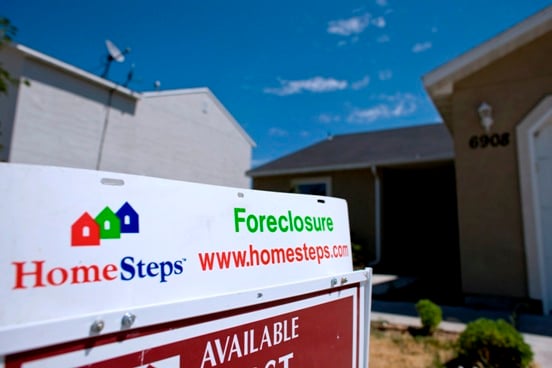Seizures, defaults on pace to hit record number; 'serious price depreciation'
U.S. home seizures reached a record for the third time in five months in August as lenders completed the foreclosure process for thousands of delinquent owners, according to RealtyTrac Inc.
Bank repossessions climbed 25 percent from a year earlier to 95,364, the most since the Irvine, California-based data provider began keeping records in 2005. Foreclosure filings, including default and auction notices, fell 5 percent to 338,836. One out of every 381 U.S. households received a filing, RealtyTrac said today in a statement.
“We're on track for a record year for homes in foreclosure and repossessions,” Rick Sharga, RealtyTrac's senior vice president, said in a telephone interview. “There is no improvement in the underlying economic conditions.”
Foreclosures are contributing to a growing housing supply that may add as many as 12 million homes to the U.S. market. Demand is crumbling amid high unemployment and following the expiration of a federal homebuyer tax credit in April. Sales of new and existing homes fell in July to the lowest level on record. Home prices have fallen 28 percent since 2006, according to the S&P/Case-Shiller index of values in 20 U.S. cities.
About 2 million houses will be seized by lenders through 2011, according to Mark Zandi, chief economist of Moody's Analytics in West Chester, Pennsylvania. Home sales this year will be 7 percent below the 2009 total, Fannie Mae, the largest U.S. mortgage finance company, said yesterday in a report.
Default notices are falling while seizures rise because lenders are trying to control the number of properties that enter the foreclosure process, RealtyTrac said. That doesn't mean more owners are catching up on their mortgage payments, Sharga said.
‘Serious Price Depreciation'
“If the market is left to fend for itself, you may see more serious price depreciation,” he said. “Whether things fall precipitously depends on government and lenders controlling the inflow of new foreclosure actions.”
The number of homes that received default notices last month was 96,469, down 1 percent from July and 30 percent from a year earlier, RealtyTrac said. A default notice is the first stage of foreclosure. They peaked at 142,064 in April 2009.
A foreclosure auction, the second stage in the process, was scheduled on 147,003 properties, up 9 percent from July and 2 percent from August 2009. The record was 158,105 in March.
Bank seizures rose 3 percent from July and had their ninth straight monthly increase on a year-over-year basis, RealtyTrac said. The August total was 1.7 percent more than the previous record of 93,777 set in May.
Highest in Nevada
Nevada had the highest foreclosure rate for the 44th straight month. One in every 84 households got a notice, more than four times the national average. Filings fell 25 percent from a year earlier.
Florida had the second-highest rate, at one in every 155 households, two and a half times the U.S. average. Filings fell 8.9 percent from a year earlier. Arizona ranked third at one in 165 households, and California was fourth at one in 194.
Idaho ranked fifth at one in 220 households, with filings up 8.9 percent from July and 11 percent from a year earlier, RealtyTrac said. Utah, Georgia, Michigan, Illinois and Hawaii also ranked among the 10 highest rates.
Five states accounted for more than half of all U.S. filings, led by California's 69,143, a fifth of the national total. Filings in the most populous state rose 3 percent from July and declined 25 percent from a year earlier.
Second in Filings
Florida ranked second with 56,877 filings, up 10 percent from July and down 9 percent from a year earlier. The state accounted for almost 17 percent of the U.S. total. Michigan was third at 17,764 filings, followed by Illinois at 16,808 and Arizona at 16,510.
Georgia, Texas, Ohio, Nevada and Washington rounded out the top 10, said RealtyTrac, which sells default data from more than 2,200 counties representing 90 percent of the U.S. population.
As many as 8 million homes that are owned or will be seized by banks have yet to reach the market, according to Oliver Chang, a U.S. housing strategist with Morgan Stanley in San Francisco. Owners of 3.8 million more homes said they are “very likely” to put them up for sale within six months if there is improvement, a survey by Seattle-based Zillow Inc. showed.







